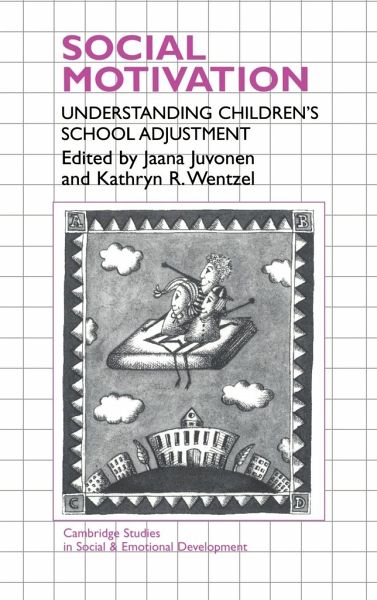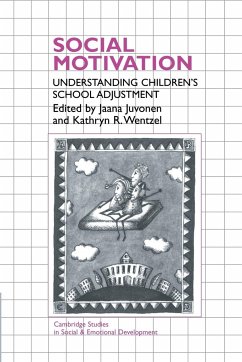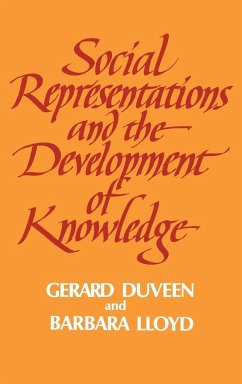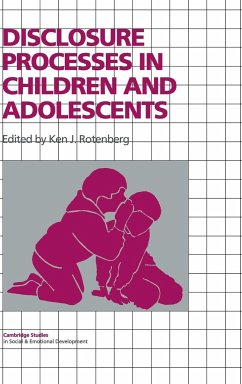
Social Motivation
Understanding Children's School Adjustment
Herausgeber: Juvonen, Jaana; Wentzel, Kathryn R.; Wetzel, Kathryn R.
Versandkostenfrei!
Versandfertig in 1-2 Wochen
137,99 €
inkl. MwSt.

PAYBACK Punkte
69 °P sammeln!
How are children's social lives at school related to their motivation to achieve and how do motivational and social processes interact to explain children's adjustment at school? This volume, featuring work by leading researchers in educational and developmental psychology, provides new perspectives on how and why children tend to thrive or fail at school. The individual chapters examine the unique roles of peers and teachers in communicating and reinforcing school-related attitudes, expectations, and definitions of self. Relations of children's school adjustment to school motivation, interper...
How are children's social lives at school related to their motivation to achieve and how do motivational and social processes interact to explain children's adjustment at school? This volume, featuring work by leading researchers in educational and developmental psychology, provides new perspectives on how and why children tend to thrive or fail at school. The individual chapters examine the unique roles of peers and teachers in communicating and reinforcing school-related attitudes, expectations, and definitions of self. Relations of children's school adjustment to school motivation, interpersonal functioning, and social skillfulness are also explored. The developmental and social perspectives on motivation and achievement presented in this volume provide new insights into the complex processes contributing to school success.
Table of contents:
1. Introduction; Part I. Social Motivation: Perceptions on Self: 2. Teacher and classmate influences on scholastic motivation self-esteem and level of voice in adolescents Susan Harter; 3. Self-presentation tactics promoting teacher and peer approval: the function of excuses and other clever explanations Jaana Juvonen; 4. Social self-discrepancy: a theory relating peer relationship problems and school maladjustment Janis B. Kupersmidt, Kathy S. Buchele, Mary Ellen Voeller and Constantine Sedikides; 5. Motivational approaches to aggression within the context of peer relationships Cynthia A. Erdley; 6. Motivational opportunities and obstacles associated with social responsibility and caring behavior in school context Martin E. Ford; 7. Modeling and self-efficacy influences on children's development of self-regulation Dave H. Shunk and Barry J. Zimmerman; 8. Commentary: goals and social-cognitive processes Carol S. Dweck; Part II. Social Motivation: Perspectives on Relationships: 9. Interpersonal relationships in the school environment and children's early school adjustment: the role of teachers and peers Sondra H. Birch and Gary W. Ladd; 10. Social goals and social relationships as motivators of school adjustment Kathryn R. Wentzel; 11. Friends' influence on school adjustment: a motivational analysis Thomas J. Berndt and Keunho Keefe; 12. Peer networks and students' classroom engagement during childhood and adolescence Thomas A. Kindermann, Tanya L. McCollam and Ellsworth Gibson Jr.; 13. Academic failure and school dropout: the influence of peers Shelley Hymel, Colin Comfort, Kimberly Schonert-Reichl and Patricia McDougall; 14. Commentary: what's 'emotional' about social motivation? Sondra Graham.
In Social Motivation, top researchers in educational psychology and social development demonstrate how children's school adjustment depends not only on their academic competence but also on their social skills, school related attitudes, expectations and definitions of self.
Social Motivation examines the essential interaction between social functioning and success at school.
Table of contents:
1. Introduction; Part I. Social Motivation: Perceptions on Self: 2. Teacher and classmate influences on scholastic motivation self-esteem and level of voice in adolescents Susan Harter; 3. Self-presentation tactics promoting teacher and peer approval: the function of excuses and other clever explanations Jaana Juvonen; 4. Social self-discrepancy: a theory relating peer relationship problems and school maladjustment Janis B. Kupersmidt, Kathy S. Buchele, Mary Ellen Voeller and Constantine Sedikides; 5. Motivational approaches to aggression within the context of peer relationships Cynthia A. Erdley; 6. Motivational opportunities and obstacles associated with social responsibility and caring behavior in school context Martin E. Ford; 7. Modeling and self-efficacy influences on children's development of self-regulation Dave H. Shunk and Barry J. Zimmerman; 8. Commentary: goals and social-cognitive processes Carol S. Dweck; Part II. Social Motivation: Perspectives on Relationships: 9. Interpersonal relationships in the school environment and children's early school adjustment: the role of teachers and peers Sondra H. Birch and Gary W. Ladd; 10. Social goals and social relationships as motivators of school adjustment Kathryn R. Wentzel; 11. Friends' influence on school adjustment: a motivational analysis Thomas J. Berndt and Keunho Keefe; 12. Peer networks and students' classroom engagement during childhood and adolescence Thomas A. Kindermann, Tanya L. McCollam and Ellsworth Gibson Jr.; 13. Academic failure and school dropout: the influence of peers Shelley Hymel, Colin Comfort, Kimberly Schonert-Reichl and Patricia McDougall; 14. Commentary: what's 'emotional' about social motivation? Sondra Graham.
In Social Motivation, top researchers in educational psychology and social development demonstrate how children's school adjustment depends not only on their academic competence but also on their social skills, school related attitudes, expectations and definitions of self.
Social Motivation examines the essential interaction between social functioning and success at school.














